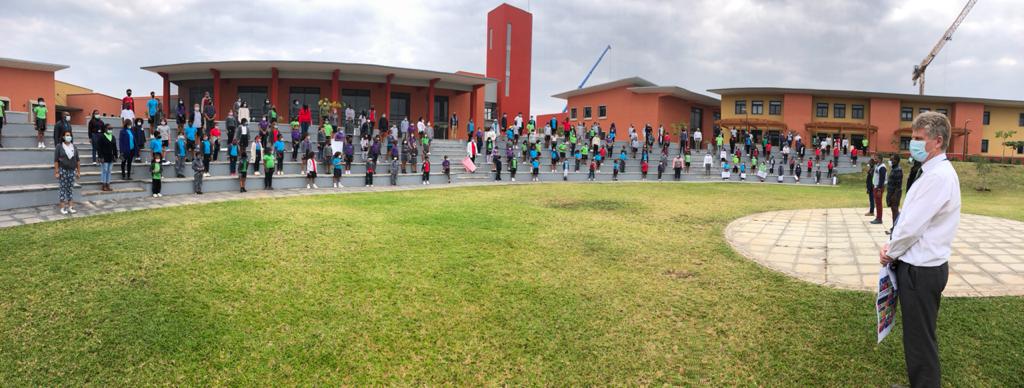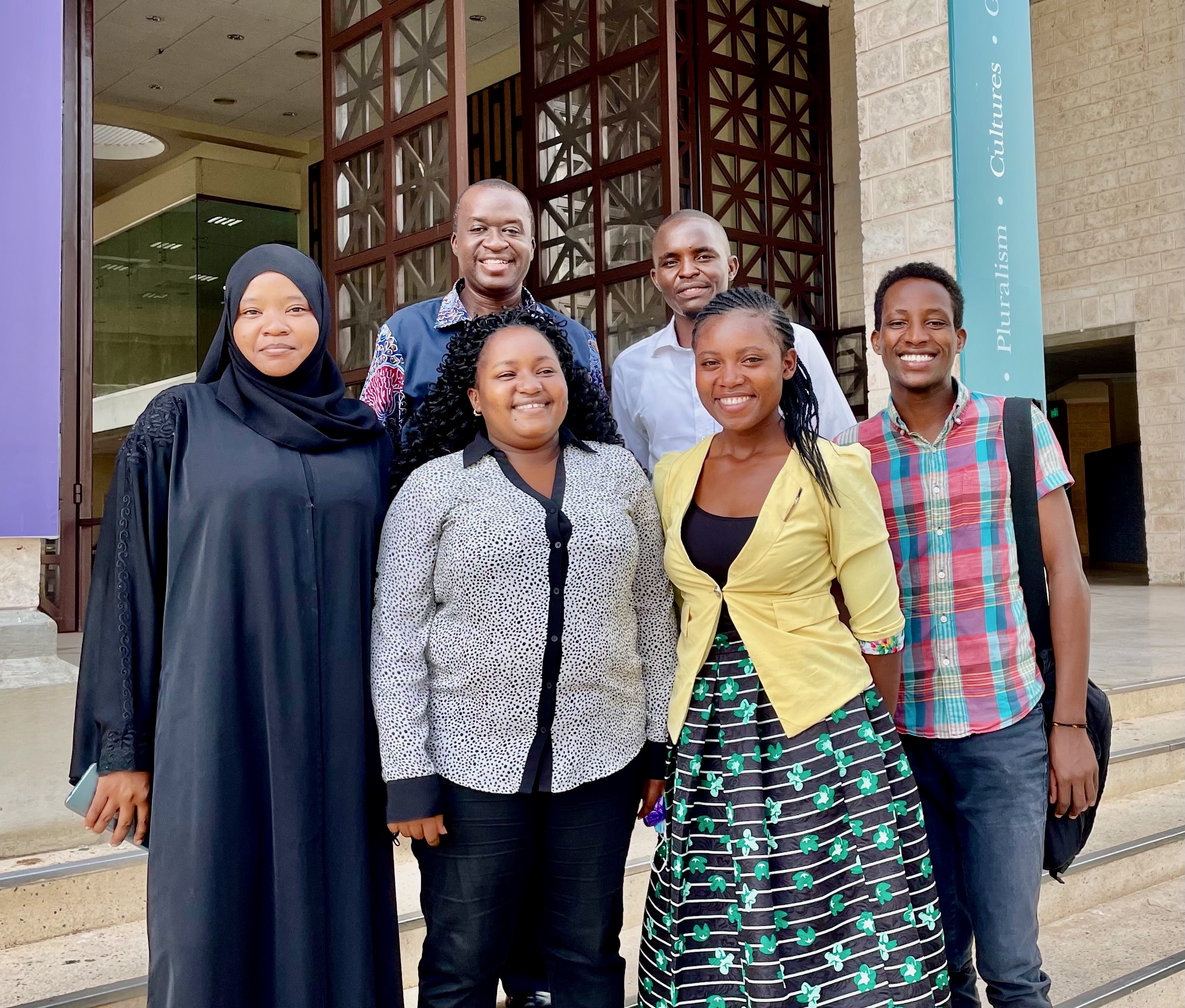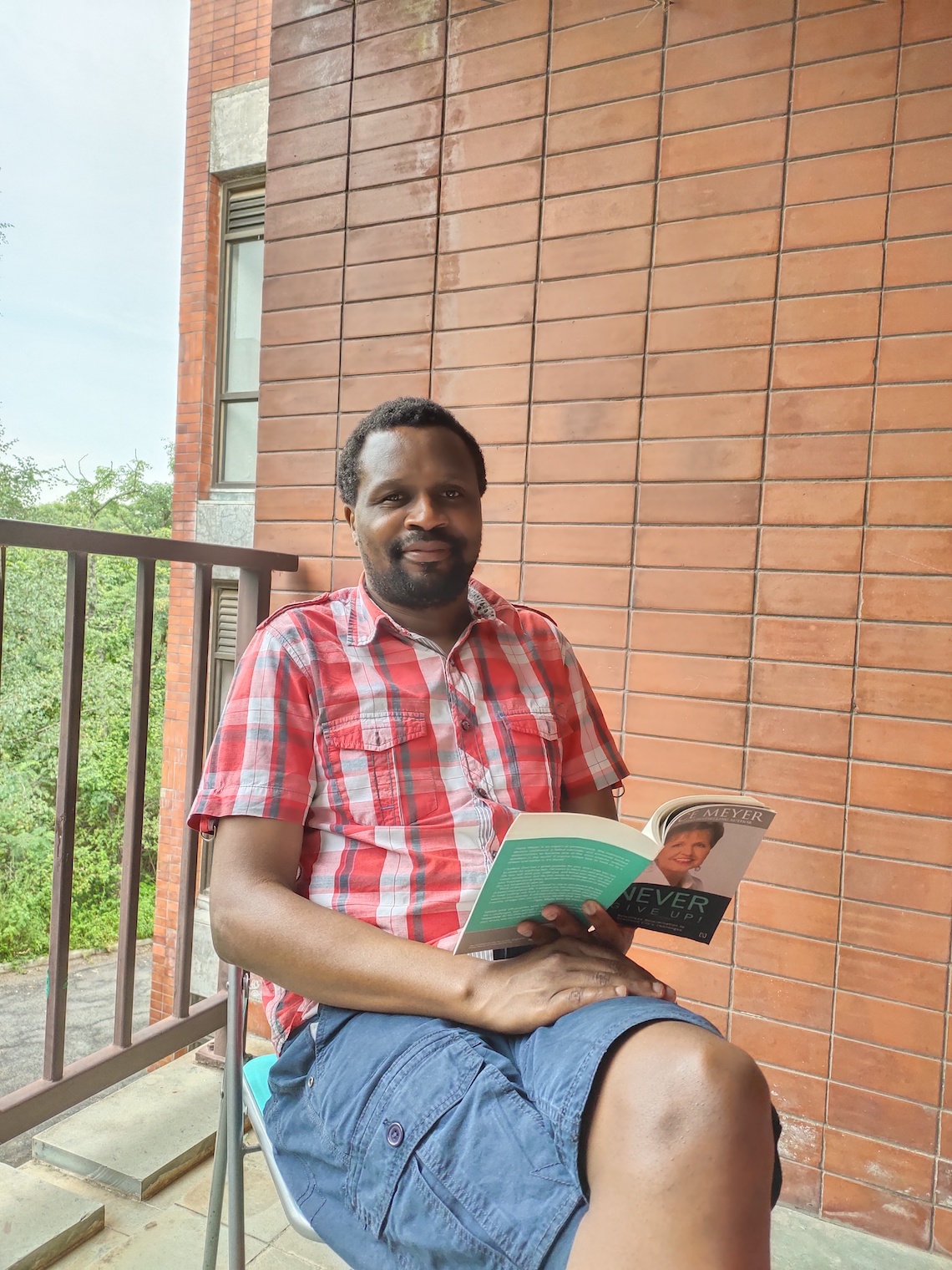
International Baccalaureate
The Aga Khan Academy Maputo follows the principles of the International Baccalaureate (IB) and is preparing to become an authorised IB World School.
The International Baccalaureate is a non-profit educational foundation, motivated by its mission to create a better world through education.
The three IB programmes for students aged 3 to 19 help develop the intellectual, personal, emotional and social skills to live, learn and work in a rapidly globalising world.
Aims of the IB Programme
Founded in 1968, the International Baccalureate currently works with 3,423 schools in 141 countries to develop and offer their programmes to over one million students.
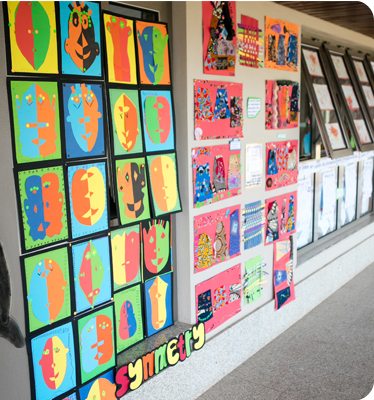 Their mission statement declares: "The International Baccalaureate aims to develop inquiring, knowledgeable and caring young people who help to create a better and more peaceful world through intercultural understanding and respect."
Their mission statement declares: "The International Baccalaureate aims to develop inquiring, knowledgeable and caring young people who help to create a better and more peaceful world through intercultural understanding and respect."
"To this end the organisation works with schools, governments and international organisations to develop challenging programmes of international education and rigorous assessment. These programmes encourage students across the world to become active, compassionate and lifelong learners who understand that other people, with their differences, can also be right."
The IB is more than its educational programmes and certificates. At heart they are motivated by a mission to create a better world through education.
They value their hard-earned reputation for quality, for high standards and for pedagogical leadership. They achieve their goals by working with partners and by actively involving stakeholders, particularly teachers.
The three programmes are:
Primary Years Programme
The Primary Years Programme (PYP) focuses on the development of the whole child, addressing social, physical, emotional and cultural needs, while giving students a strong foundation in all of the major areas of knowledge.
Through the PYP, children become aware of and sensitive to the points of view of people in other parts of the world.
Middle Years Programme
The Middle Years Programme (MYP) integrates the study of all the major disciplines, including languages, sciences, literature and the social sciences, mathematics, arts, technology and physical education.
The MYP normally includes a service component designed to encourage students to become involved with their communities.
Diploma Programme
The Diploma Programme (DP) is a two-year course of study that prepares students for university. All DP students study languages, a social science, an experimental science, mathematics and, usually, an arts subject.
At the same time as it provides a form of academic passport, the DP generally fulfils the requirements of a student's national education system. Each student's performance is evaluated by independent examiners and measured by his or her levels of knowledge and skills relative to set standards applied to all schools.
For further information please visit the IB website.
News
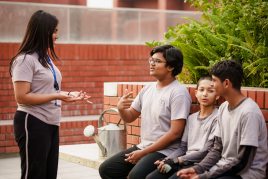
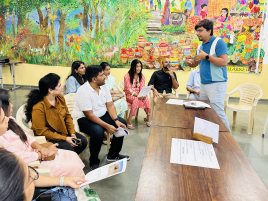
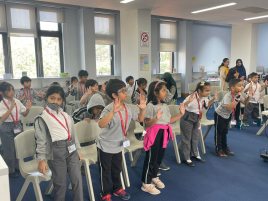

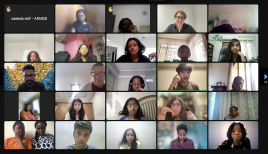
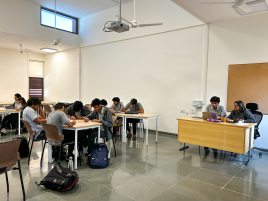


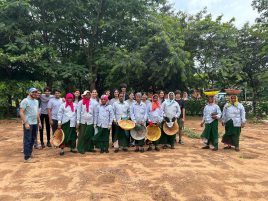
Pages
Sumeya Taquidir: Becoming a dynamic teacher
Sumeya Nemane Ussene Taquidir believes learning is a continuous process and that the Aga Khan Strands help her, as a teacher, to be dynamic and creative.
Sumeya is a year 6 and 7 Middle Years Programme science teacher, who joined the Aga Khan Academies through the Teacher Preparation Programme, which develops new teachers into International Baccalaureate practitioners. She spent a full academic year at the Aga Khan Academy Mombasa as part of her training through the programme before joining the Aga Khan Academy Maputo.
Born in Maputo, Mozambique, Sumeya graduated with a Bachelor’s of Education in science (Physics and Minor Electronic) from the Pedagogical University, Mozambique. She joined the Academies because of their philosophy of education, which engages students actively in the process of learning, and the environment of continuous professional development that helps teachers develop effective teaching methods.
During her time in Mombasa, Sumeya had the opportunity to learn how to improve her teaching skills. When asked what helped her become a more effective teacher, she said it was, “the opportunity to go to the Academy in Mombasa for training, [where] we received support in various areas in order to improve our methodologies of teaching. [The Academy provided] us the opportunity to participate in workshops, online trainings and use online resources.”
Sumeya feels that the most rewarding aspect of teaching is when she sees students applying the Aga Khan (AK) Strands in different ways. The Aga Khan Strands are cross-curricular areas of learning that help students develop dispositions and knowledge required by future leaders. Sumeya recalls, “My special memory from the Academy in Mombasa was my first day of teaching. I was very nervous mainly because I was being observed. The lesson was good, the students were familiar with the learner profile and the AK Strands, therefore, it was easy to deliver the lesson.”
She believes that with the teacher’s incorporation of the AK Strands and the learner profile into lessons, the students are better able to understand why they should respect other cultures and work together.
Although Sumeya knows that teaching is not an easy job at times, she believes that accepting challenges, communicating with students and their parents, and reflecting on teaching helps achieve positive results.
“I think it is important to create an environment with mutual respect, honesty, good relationships, and communication should be a highest priority…My rule as a teacher is to guide the students to build [their] knowledge and provide a safe environment for learning with collaborative work, respect and sharing ideas among them.”
The Academies are designed as residential schools, with many of the Senior School students living on campus. During her time in Mombasa, Sumeya had the opportunity to interact with students in the Academy’s residences, and believes that residential life complements academics and produces leaders. “They can have a different experience living with others of different cultures. They can build the spirit of leadership and they learn to think for themselves."
Teaching is ultimately a two-way process for Sumeya. She explains that she too learns from the unique environment of the Academies and through interaction with students of diverse backgrounds. “I am conscious that learning is a continuous process; every day we learn something new [which] makes me more curious to learn new things. That is why we have to be creative and dynamic teachers.”
By Inaara Gangji
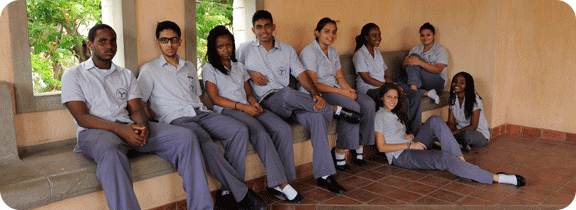
Quick Facts about the Academy
The Aga Khan Academy Mombasa (established 2003)
Location: Kizingo area of Mombasa Island
Campus size: 18 acres of land; campus design inspired by local Swahili architecture
Curriculum
The Aga Khan Academy Mombasa is an International Baccalaureate (IB) World School
IB programmes:
- Primary Years Programme: years 1–5
- Middle Years Programme: years 6–10
- Diploma Programme: years 11–12
Aga Khan Curricular Strands, implemented across the curriculum:
Ethics, Pluralism, Cultures (with an emphasis on Muslim civilisations), Governance and Civil Society, and Economics for Development
Staff and students
Faculty numbers: 7 senior management, 70 Senior School faculty, 27 Junior School faculty, 104 administrative staff
Number of students currently enrolled: 687 day and residential students in total: 181 day students in the Junior School; 506 day and residential students in the Senior School, with 270 in residence
Numbers of students and teachers at full capacity: 750 students and 90 teachers, with over 30% of students receiving some form of financial aid
First IB Diploma Programme graduating class: 2007
Residential students
Number of residential students: 270 currently, with full capacity of 300 students
Number of students per room: Between 1 and 4, with second year Diploma Programme students in single or double rooms
Residential facilities: Student lounge with large-screen television, study areas, laundry facilities, dining hall
Campus facilities
Sports facilities: 25-metre swimming pool, diving pool, full-sized sport field, Astroturf field, gym,
three regulation-sized basketball courts, cricket pitch, tennis courts, squash courts, badminton court, volleyball court, netball court and junior play area
Arts facilities: Rooms for fine arts, music, dance; individual music practice booths; music recording area; amphitheatre performance space
Academic areas: Junior School classrooms, Senior School classrooms, science and computer laboratories, multiple-award-winning library and resource centre, arts facilities, music and dance studios
Residential buildings: Six residential blocks: three male and three female; 4–6 dorm parent apartments in each block. Each block has a central atrium, lounge area, ocean view, patio and laundry facilities
Technology: The Aga Khan Academy Mombasa has been named a Microsoft Showcase School, the only school in East Africa to receive this designation
Professional Development Centre
The Aga Khan Academy Mombasa is home to a Professional Development Centre for the advancement of teachers. The primary objective of this centre is to provide professional development that will benefit the wider school system in Kenya.
Programming began in June 2010 with a Professional Learning for Educators Series for teachers in local government, independent and not-for profit schools.
Through the Microsoft Showcase Schools programme, the Aga Khan Academy Mombasa shares ideas globally and supports other schools in Kenya to improve learning and student outcomes through technology.
The Aga Khan Academies network
18 Academies are planned in South and Central Asia, Africa and the Middle East.
3 Academies are currently operating: Mombasa, Kenya (opened 2003); Hyderabad, India (opened 2011); and Maputo, Mozambique (opened 2013).
When complete, the network will represent 2,000 teachers and 14,000 students (boys and girls), with 1,400 graduates annually.
Institutional partnerships include:
Agencies of the Aga Khan Development Network; universities including Harvard, Oxford, Toronto and University of California, Los Angeles; secondary schools including Phillips Academy, Andover, USA and Schule Schloss Salem, Germany.
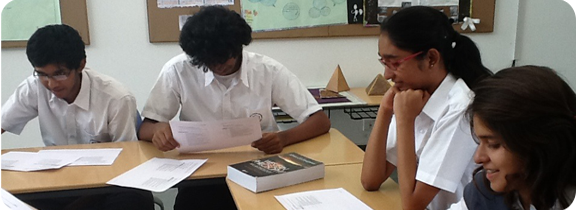
About the Academy
The Aga Khan Academy Dhaka is the fourth in the network of the Aga Khan Academies established by His Highness the Aga Khan.
The Academy features state-of-the-art facilities, a multicultural student body and an experienced team of educators and staff. We provide students with education of the highest standard in order to prepare them for lives characterised by leadership and service.
Admission to the Academy is competitive and based on student merit.
Mission statement
The following is the mission statement of the Aga Khan Academy Dhaka:
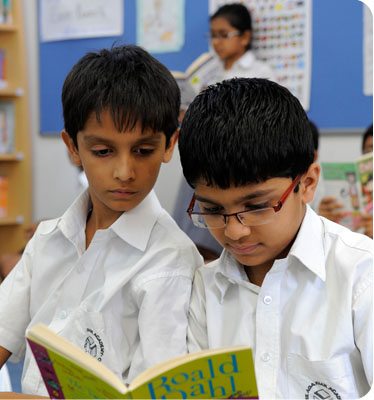 "The Academy will identify and nurture exceptional young people from any background with the potential to become effective, ethical leaders. It will be a joyful community of lifelong, fearless learners who are culturally-rooted and internationally-minded. Academy graduates will be reflective, compassionate, adventurous and creative citizens empowered as stewards to make a positive contribution in a changing world."
"The Academy will identify and nurture exceptional young people from any background with the potential to become effective, ethical leaders. It will be a joyful community of lifelong, fearless learners who are culturally-rooted and internationally-minded. Academy graduates will be reflective, compassionate, adventurous and creative citizens empowered as stewards to make a positive contribution in a changing world."
A culture of excellence
As with all the Aga Khan Academies, we are committed to excellence in all aspects of education. This commitment includes the academic curriculum as well as the campus where students live and learn.
Our campus is architect designed and purpose-built. It features state-of-the-art classrooms and resource areas, and extensive sports facilities. These outstanding facilities provide an inspiring environment for both students and staff.
At the Academy, we strive to create a balance between academic demands, sports, cultural activities, and community life. We challenge our students to be intellectually inquisitive and socially conscious. We also encourage them to respect and appreciate other people’s cultures, social structures, values and beliefs.
A rigorous academic programme
The network of Aga Khan Academies has developed its academic programme in line with the widely-recognised International Baccalaureate.
Following in the footsteps of its sister schools in Mombasa, Hyderabad and Maputo, the Aga Khan Academy Dhaka is pursuing authorisation as an IB World School.
The programme is designed to challenge students of all backgrounds.
Our aims for our students include:
- promoting academic excellence
- enhancing analytical and study skills
- building leadership skills
- fostering an ethical outlook and sense of civic responsibility
- developing an understanding of local context and global issues
- encouraging creativity.
Experienced local and international teachers lead our programmes. Faculty members are up-to-date with the best educational practices. They are committed both to their students’ learning and to their own continuing professional development.
Spotlight: Mercy Muthui
This is Mercy, a teacher at the Aga Khan Academy Mombasa who joined through the Teacher Preparation Programme. Mercy fosters profound and meaningful relationships with everyone around her and consistently encourages her students to be the best versions of themselves.
Bernardo Arsénio: Inspired teacher with a mission
Bernardo learned from the Aga Khan Academies that knowledge cannot just be seen as something that starts and ends in a classroom, but that knowledge should also be applicable outside the classroom to solve real problems in real life.
Bernardo Arsénio’s journey to becoming a teacher started when he was in year 11 of his school in Maputo, Mozambique. He had a history teacher who used to make fun of him in the classroom. “He used to come to my desk and ask me what I was doing in his class,” Bernardo says. The teacher did that continuously throughout the year. This affected Bernardo’s performance and motivation to be in that class. He failed the class that year.
“But then I realised I could not let him win… I knew that I am supposed to be in class to learn and not to just let someone de-motivate me because he thinks I shouldn’t be there." Bernardo went to talk to his principal who allowed him to attend the class with the same teacher in spite of failing the class. Bernardo later realised that he had to change his attitude if his teacher did not change his. “So I started attending his class – I used to do all the assignments, tests and homework. I never missed even one class in the year,” he says. Bernardo’s constant efforts were noticed by the teacher – Bernardo even achieved the highest mark that year. In turn, the teacher’s attitude towards him changed for the better.
By giving an example from his life, Bernardo explains why a healthy relationship between a teacher and a student is so important. Having a teacher who does not care and does not motivate the students can have negative consequences. “It almost happened to me and I did not let it happen. I used the negative motivation to change it into a positive one – that inspired me to become a teacher,” he says vehemently.
Bernardo pursued History at Eduardo Mondlane University in Maputo. After graduating with a degree in History and a minor in Information Management in 2015, Bernardo began teaching history in a private school – Centro de Exames de Admissão. Desiring even more teaching skills, Bernardo took a six-month postgraduate course in 2016 at Universidade Pedagógica, specialising in teaching methodology.
After a rigorous selection process, Bernardo was one of six individuals who were given the opportunity for a year-long exchange at the Aga Khan Academy in Mombasa, Kenya as part of the Teacher Preparation Programme. “I was lucky to be in the group to come to Mombasa. That was when my journey started,” he says. At the Aga Khan Academy Mombasa, Bernardo went through three weeks of intensive English training. He humbly says, “We got support from each and every person in the Academy. To reach this level, for me to be able to communicate and to go to class and discuss a certain topic was all because we got so much help. I was challenged in class and felt I could not do it. When you feel you cannot do it, you think you are drowning but find yourself swimming and coming out of water; it was very meaningful.” Bernardo ended up teaching Humanities and History to students in Grades 6 to 9.
When he came to the Aga Khan Academy Mombasa, the first thing Bernardo noticed was how the students played an important role in their education and how they took the responsibility for their own education. He says, “Back at home, the environment is where the teacher owns the knowledge and dominates the classroom.” He also remembers going to a Theory of Knowledge class at the Academy and noticing how the students did not learn by rote but were encouraged to discuss and make sense of what was being taught. The method by which the class was taught thoroughly impressed him.
At the Aga Khan Academy Mombasa, Bernardo mentions how amazed he was to see such cultural and religious diversity. He took note of the unity with which everyone participated in school, for example by focusing on their similarities instead of their differences. He was also impressed with how sports classes were taught at the Academy, utilised as an opportunity for students to get together and learn about their similarities and differences. Bernardo found the people in Mombasa very warm and friendly and he did not feel far away from home.
Bernardo is now back in Mozambique, teaching at the Aga Khan Academy Maputo. He will continue to be a Humanities and History teacher and is helping support the growth of the Academy as they implement the International Baccalaureate (IB) Middle Years Programme. He strongly feels that a teacher should connect what is being taught to real life. For Bernardo, a teacher must motivate and support the students, and should enable students to develop and become better people.
